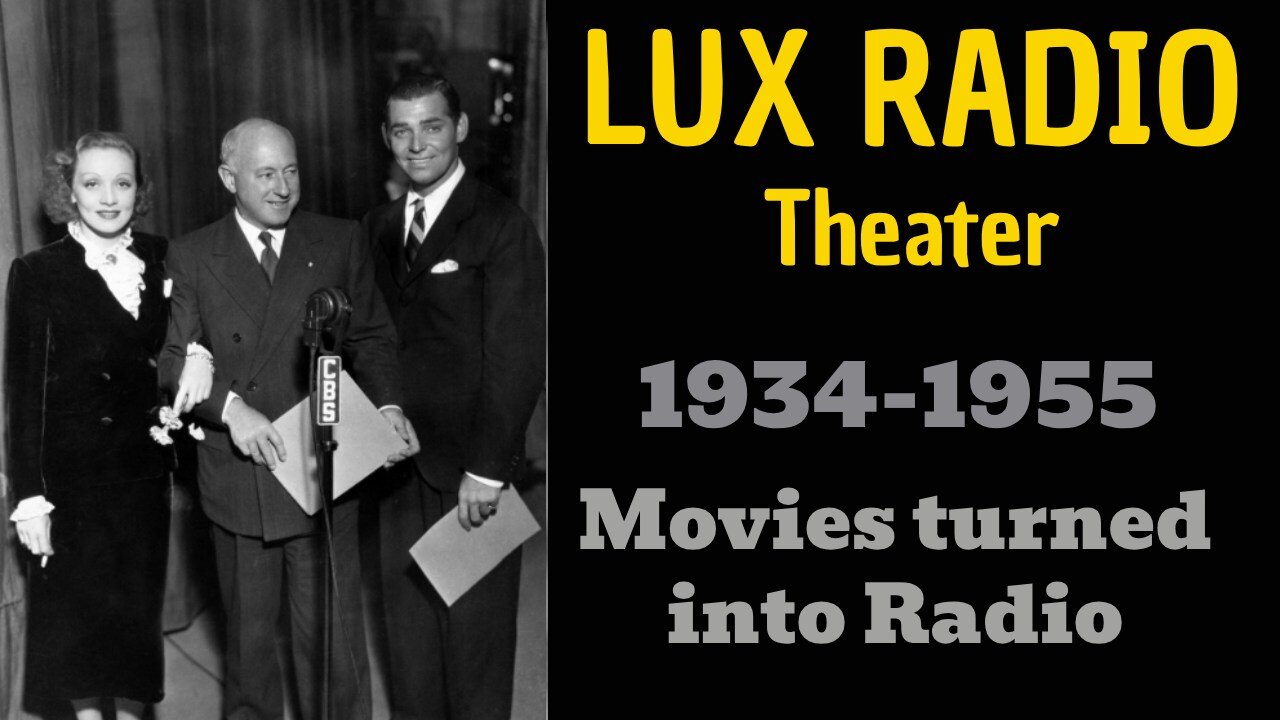Premium Only Content

Lux Radio (1937) Dulcy (George Burns, Gracie Allen)
Plot
Bill Ward wants to marry wealthy Angela Forbes and goes to the pier to meet her parents' cruise ship when it arrives. Bill's sister Dulcy goes along, but rather than greet the Forbeses, she becomes distracted by arriving passenger Gordon Daly.
Dulcy has a habit of doing the wrong thing. When she learns that Gordon has invented a new airplane motor and needs to raise capital, she invites him to meet Roger Forbes, father of her brother's fiancée. Then she makes a mistake during Gordon's presentation that causes the motor to spit oil in Mr. Forbes's face. He leaves in a huff.
Bill and Angela decide to elope. Dulcy introduces them to a man she's just met, Schuyler Van Dyke, who offers to fund Gordon's enterprise. All is well until Dulcy learns that Van Dyke is actually a man named Patterson who suffers from delusions of grandeur. Luckily for all, Roger Forbes returns and outbids Van Dyke for the invention, making Dulcy an accidental hero.
Lux Radio Theatre was indisputably the biggest, most important, most expensive drama anthology program on radio. It ran from October 14, 1934 until June 7, 1955, then continued on television as Lux Video Theatre until 1957. In all, some 926 episodes were broadcast, providing a record of the most important entertainment events in American theatre and, later, film.
The show was first broadcast on the NBC Blue Network on Sundays at 2:30 PM. The show featured adaptations of successful Broadway plays when it was produced out of New York, such as Seventh Heaven, the first production starring Miriam Hopkins, Smilin' Through, Berkeley Square, Daddy Long Legs, Peg O' My Heart and Way Down East. On July 29, 1935, the show moved to Monday night at 9:00 PM on CBS, where it would stay until June 29, 1954. The show moved to Hollywood on May 25, 1936 with the production of The Legionnaire and the Lady, based on the film Morocco, starring Marlene Dietrich and Clark Gable. The audience for this production was estimated as high as 40 million. The show featured many of the most important films of the period, adapted to fit the 60 minute time slot. Some of the titles for 1939 should indicate the caliber and range of shows: Stage Door, Ceiling Zero, So Big, It Happened One Night, The Lives of a Bengal Lancer, Lady for a Day, The Life of Emile Zola, Tovarich, Only Angels Have Wings, The Prisoner of Zenda, The Awful Truth, Wuthering Heights, You Can't Take It With You, The Old Maid and Goodbye, Mr Chips. For its last season, (1954-1955), the show moved to Tuesday nights at 9 on NBC.
Lux Radio Theatre was always broadcast live, with a studio audience and a full orchestra accompanying the performance and providing musical transitions between scenes. As many film actors were used to numerous takes and not live performance, they sometimes suffered acute stage fright before the show. However, since most received $5,000 for their performance -- in addition to free publicity for upcoming pictures -- actors appeared in their original screen roles if they were available. Indeed, production would halt if necessary, on a film if performers were called to appear on Lux. When the actors were not available, others stepped in. The plays were assembled and rehearsed for a week, in sharp contrast to many other shows, which required a minimal of an actor's time. Regular players for the series included Jim and Marian Jordan, otherwise known as Fibber McGee and Molly. Hosts included Cecil B. DeMille (1936-1945), William Keighley (1945-1952) and Irving Cummings (1952-1955). Directors included Tony Stanford, Frank Woodruff, Fred MacKaye and Earl Ebi.
-
 LIVE
LIVE
Revenge of the Cis
2 hours agoEpisode 1450: Wet Work
1,638 watching -

vivafrei
8 hours agoKash Patel Confirmation Hearing LIVE! Jan. 6'er Kicked Out of CPAC? DOGE Wins in Court? & MORE!
223K223 -
 5:08:38
5:08:38
Barry Cunningham
8 hours agoTRUMP DAILY BRIEFING: KASH PATEL VOTE | WHITE HOUSE PRESS CONFERENCE | DOGE UPDATE
34K20 -
 1:57:54
1:57:54
The Quartering
6 hours agoRand Paul Praises Trump, Amazon Takes Control of Bond, and Delta Gives Passengers $30,000
70.7K30 -
 1:01:59
1:01:59
The White House
4 hours agoPress Secretary Karoline Leavitt Briefs Members of the Media, Feb. 20, 2025
81.2K89 -
 59:58
59:58
Russell Brand
6 hours agoLive from Mar-a-Lago: The Globalist Empire’s Last Stand – SF541
141K161 -
 35:23
35:23
CryptoWendyO
3 hours ago $1.95 earnedCrypto Chaos Unleashed: Trump Making USA The Bitcoin Capital Of The World
31.3K4 -
 1:03:00
1:03:00
The Dan Bongino Show
8 hours agoTrump Keeps Delivering And The Libs Are Seething (Ep. 2427) - 02/20/2025
828K2K -
 1:20:26
1:20:26
Nerdrotic
6 hours ago $4.95 earnedSuper Chat Square Up - Nerdrotic Nooner 466
76.9K2 -
 2:05:00
2:05:00
Steven Crowder
8 hours agoTrump Slams Dictator Zelensky: Why He NOW Has a Point
522K339